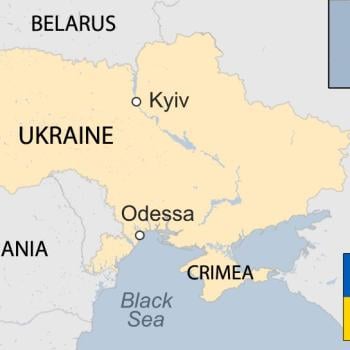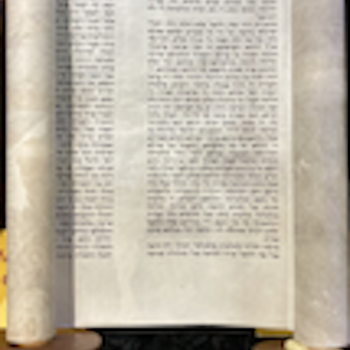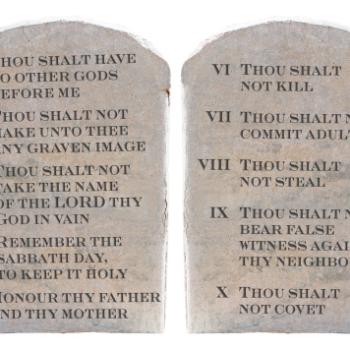 Some Christians are confused about Jesus saying to his apostles, “Whoever has seen me has seen the Father” (John 14.9 NRSV). They think Jesus therein said he is God. Here’s how they reason: (1) the Father is God, (2) Jesus said he is the Father, (3) so Jesus must be God. Their mistake in reasoning is step two: Jesus said he is the Father. Trinitarian teachers quickly correct this, and rightly so. Why? Jesus and God the Father are presented constantly in the New Testament as two persons, not one person.
Some Christians are confused about Jesus saying to his apostles, “Whoever has seen me has seen the Father” (John 14.9 NRSV). They think Jesus therein said he is God. Here’s how they reason: (1) the Father is God, (2) Jesus said he is the Father, (3) so Jesus must be God. Their mistake in reasoning is step two: Jesus said he is the Father. Trinitarian teachers quickly correct this, and rightly so. Why? Jesus and God the Father are presented constantly in the New Testament as two persons, not one person.
Scholars call this mistaken understanding—that Jesus is God the Father— “modalistic monarchianism.” It means God the Father and Jesus are not separate persons; rather, God is a single person who reveals himself in three different modes: father, son, and spirit. This was taught by church father Sabellius in the third century. The Catholic Church rightly condemned it as heresy. It has resurfaced in the United Pentecostal Church.
Jesus said this, in John 14.9, to his apostles at the Last Supper. Among the four New Testament gospels, only this author records this conversation, which is as follows:
“‘I am the way, and the truth, and the life. No one comes to the Father except through me. If you know me, you will know my Father also. From now on you do know him and have seen him.’ Philip said to him, ‘Lord, show us the Father, and we will be satisfied.’ Jesus said to him, ‘Have I been with you all this time, Philip, and you still do not know me? Whoever has seen me has seen the Father. How can you say, “Show us the Father?” Do you not believe that I am in the Father and the Father is in me? The words that I say to you I do not speak on my own; but the Father who dwells in me does his works. Believe me that I am in the Father and the Father is in me'” (John 14.6-11).
Johannine scholars label what Jesus taught in John 14.10-11 the Mutual Indwelling. And they agree that he does not therein identify himself as the Father. Jesus had taught this earlier. He first said, “The Father and I are one” (10.30). His opponents accused him of “making yourself God” (v. 33). Jesus denied that and explained that he meant, “the Father is in me and I am in the Father” (v. 38). So, “one” signified only their unity.
To understand what Jesus meant by his statement in John 14.9, it is helpful to know the Johannine author’s scheme in compiling his gospel. It begins with a prologue of eighteen verses, in John 1.1-18, with v. 1 as a mini prologue. Both serve as an outline for the rest of this gospel. That is, items in this introductory section link to various texts in the remainder of the gospel. For instance, the mini prologue consists of three clauses that are translated traditionally as follows: “In the beginning was the Word, and the Word was with God, and the Word was God.” The Johannine author also says in John 1.14, “And the Word became flesh and lived among us.” He means the Word became the man Jesus. So, the third clause in John 1.1 as traditionally translated–“and the Word was God”–means Jesus was God.
I have explained elsewhere that I think some Johannine scholars are right in alleging that this traditional translation of John 1.1c is inaccurate. It is mostly because of a grammatical issue in the Greek text which scholars disagree about. That is, in the second clause of John 1.1, theos, the Greek word for “god/God,” has an article (ho logos en pros ton theon), but theos in its third clause does not have an article (kai ho logos en theos), making it anarthrous. Also, in the third clause there is a different word order in the Greek text compared to the traditional translation of it in English. So, I think the NEB, REB, and GNB versions render this third clause in John 1.1 correctly: “and what God was, the Word was.” (They keep the word order in the Greek text.) Comparing this with John 1.14, it does not mean Jesus was God but that he was like God.
Now we will consider verses throughout the remainder of the Gospel of John that link to the three clauses in John 1.1. They can be arranged in a table as follows:
| “In the beginning was the Word” | “anyone who hears my word and believes … has eternal life” (5.24)
“the word that you hear is not mine but is from the Father” (14.24) “You have already been cleansed by the word that I have spoken” (15.3) “I have given them your word, … your word is truth” (17.14, 17) “his name is called The Word of God” (Revelation 19.13) |
| “the Word was with God” | “the one who sent me is with me; he has not left me alone” (8.29)
“I am not alone because the Father is with me” (16.32) |
| “what God was, the Word was” | “the Father is in me and I am in the Father” (10.38)
“Whoever has seen me has seen the Father” (14.9) “I am in the Father and the Father is in me” (2x in 14.10-11) “As you, Father, are in me and I am in you” (17.21) |
So, when Jesus said, “Whoever has seen me has seen the Father,” he did not mean it literally. For, the prologue states, “No man has seen God at any time” (John 1.18). And later in this gospel Jesus says, “Not that any man has seen the Father” (John 6.46). These declarations affirm the fundamental Old Testament teaching that God remains invisible to sinful humans. In fact, if they ever literally see God at any moment, they will instantly die (e.g., Exodus 33.3-5, 20). The apostle Paul reflects this truth about God the Father by writing of the “immortal, invisible, the only God, … only Sovereign, the King of kings and Lord of lords. It is he alone who has immortality and dwells in unapproachable light, whom no one has ever seen or can see” (1 Timothy 1.17; 6.16). So, Jesus must have meant that to see him was to mystically, spiritually see God in him.
Furthermore, the Johannine Jesus never identifies himself as God since that would conflict with what the author says is his purpose in writing his gospel. At its close (when this gospel was first published) he says, “these are written so that you may come to believe that Jesus is the Messiah, the Son of God, and that through believing you may have life in his name” (John 20.30-31). So, he is presenting Jesus as the Messiah, the Son of God, not that he is God, which is far greater.
To conclude, since Jesus’ saying, “Whoever has seen me has seen the Father,” means the Father is in him and not that he is the Father, and since it links to the third clause in John 1.1, this linkage indicates the third clause should not read, “the Word was God.”













